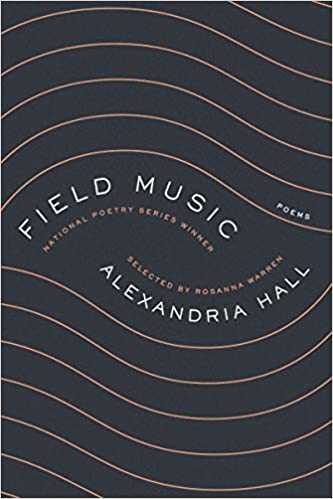Field Music
Field Music, by Alexandria Hall.
Ecco (HarperCollins), 2020,
96 pages, paper, $16.99,
ISBN: 978–0063008380.
Field Music is not a symphony centered on what’s lush or luxurious, but on a longing to uncover the stark garden speaking right in front of us: open land the color of grass that’s been hit with life. What’s left is ravenous singing, ready to challenge any starving ditch with its own story. As one of the 2019 National Poetry Series Winners, Alexandria Hall leaves even empty spaces breathless in her debut, providing a lens toward Vermont landscapes, animals, the body, planting, hunger, desire, and aging. One poem after another, Hall peels back the gauze shrouding the shared ground we walk on and work on.
Hall’s use of Northeast dialect is electric: “Awful nice a ya, wheezes Pa . . . How’s the new beau, he coughs.” Or how about when the speaker’s mother says “ancient / like ank–shint.” We’re immediately transported to a space where language is anchored by its unapologetic roughness, its origin of gritty knuckles, propane, trailers, and cockcrows.
Expertly painting Vermont in its realistic sigh of a working land, Hall does not lean toward majestic mountains; she describes every weed in its blistered glory. As she writes about a fishing trip, “Out of the water I lifted an already dead thing, / pale white with an old hook and line sprouting out of the gills. At / the end of the string hung a horrible ornament. No gasping, no / writhing, just the sagging weight.” Or in the first stanza of Field Music: “Nothing ever stays / where it ought: runoff dragged into the river / by summer rains from shit–covered fields.” In each instance we’re told to uncover the “wasps in the attic” and not be afraid of matching their sound with more intimacy and honesty.
Hall continues to unravel the deeply embedded shame many artists face when depicting nature’s ugliness. In “On Art,” her multiple apologies for pushing “words like marshmallows, words like clogged pores” actually underscore our human need to understand what’s muddy, murky, mistaken, and misused. Hall allows us to see the beauty in the bruised earth, not the beauty in a construct of being beautiful. Instead of scenic postcards from Vermont with hair whipping down a highway, we witness the perspective of what lingers but isn’t lost, like the speaker’s grandmother: “lips opened like a chicken with a broken beak.” Determined to describe the moments that brush our bones in their rawest form, Hall asks us this ultimate question: Have we been looking at the “rash goldenrod” with rose–colored glasses all along?
Furthering these complicated connections, Hall layers past and current lovers with an unshakeable velocity that simultaneously slows and sharpens our senses: “There was too much moon over the night in Middlebury / so I put a man’s face in front of it, and then I loved / that man.” Other poems hold familial memories, such as a grandmother’s crocheted owl or a mechanical bull ride just after hearing of a father’s illness. Just like “night sweat on the back of winter,” Hall argues that we’re always engaging with the after–sting of textured stillness that surrounds every relationship within the physical and personal world. The landscape is not used as a backdrop but as a moving force outlining the shoulders of each relationship’s shadows. Hall rocks us between these splayed, open–toed histories and their uncertainty hereafter: “My mother said the softest things / get torn into.”
With nods to Keats, Whitman, Rilke, Bishop, and Wordsworth, Hall’s Field Music is the rallying cry for what endures, what’s been ripped like a dandelion in a raised fist but still sings in silhouette. In “People Fall All the Time,” Hall reminds us of all that is not afraid to lie here, truthfully awake, beaming —
what stays are the song and the crash
of the tractor, the trash compactor, the machines
full of love and the fields full of breaking,
the fields where the light slips out.
— Amanda Dettmann


